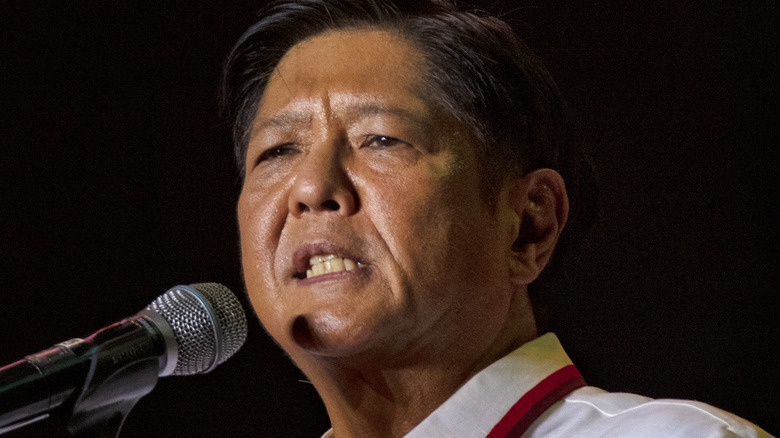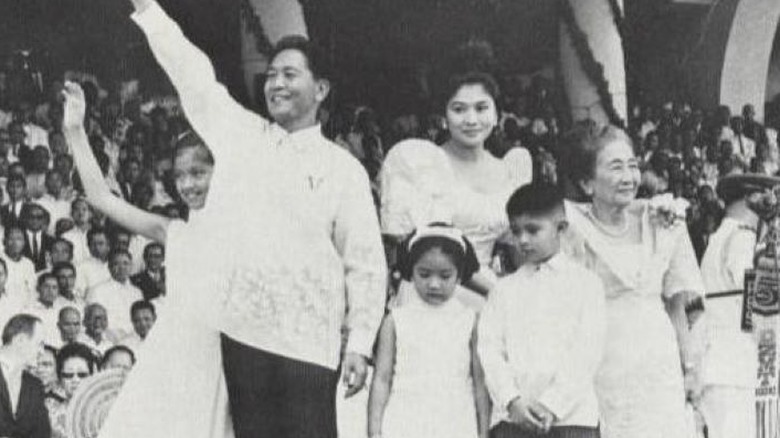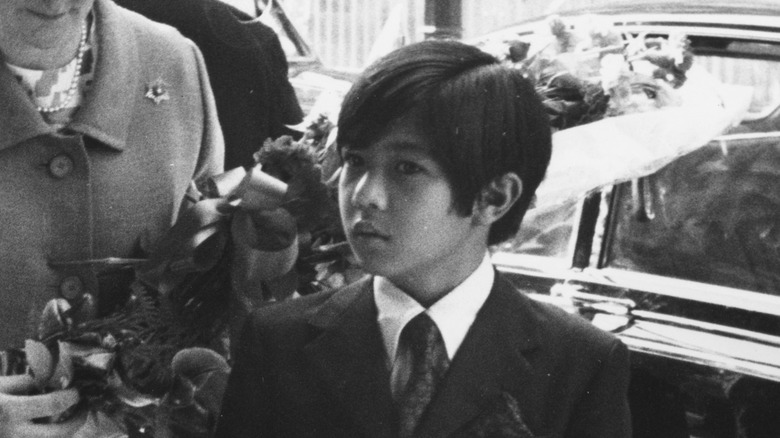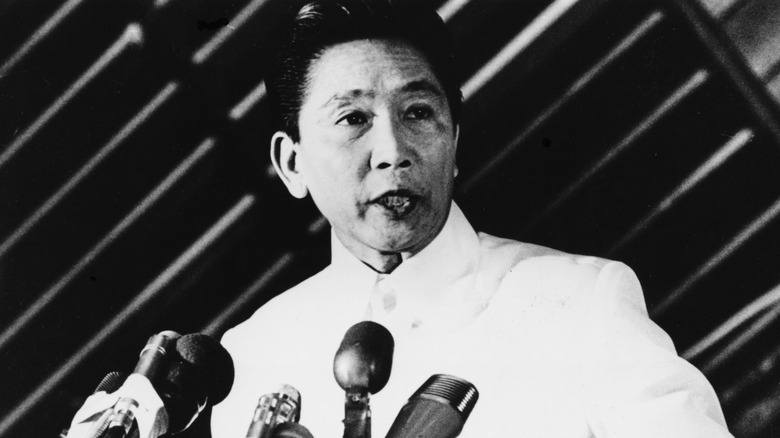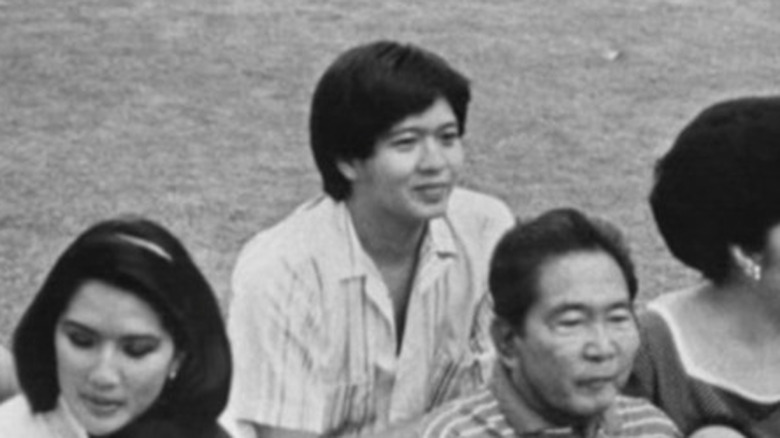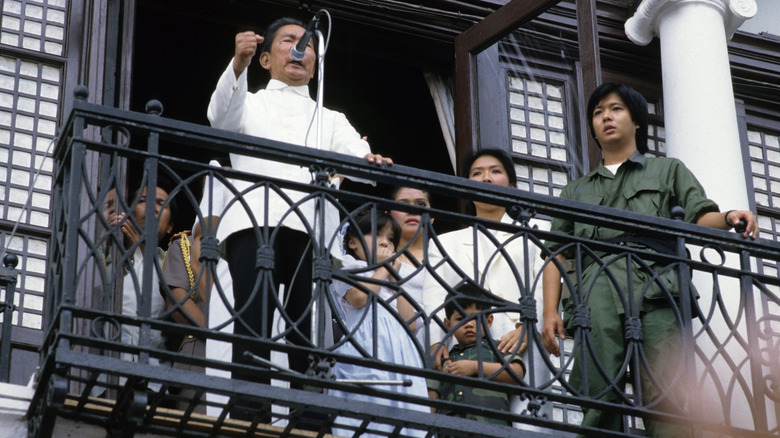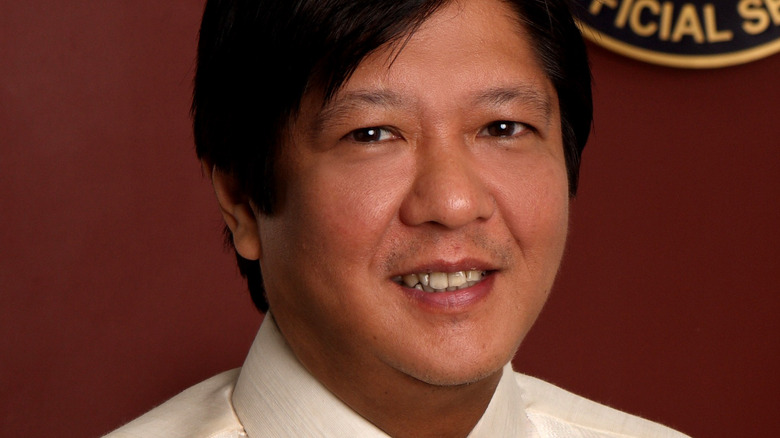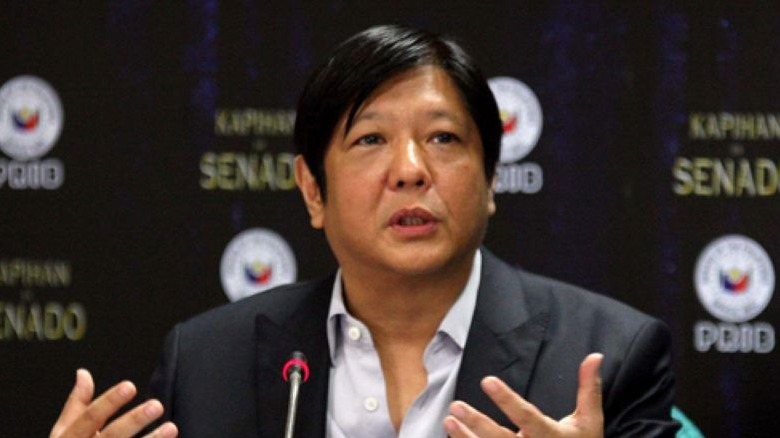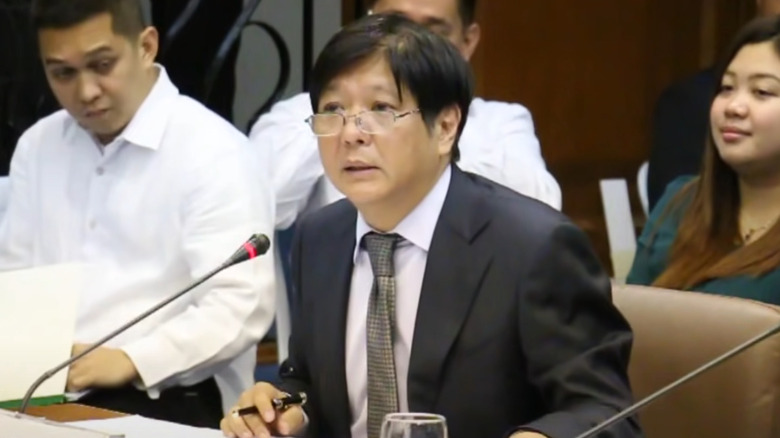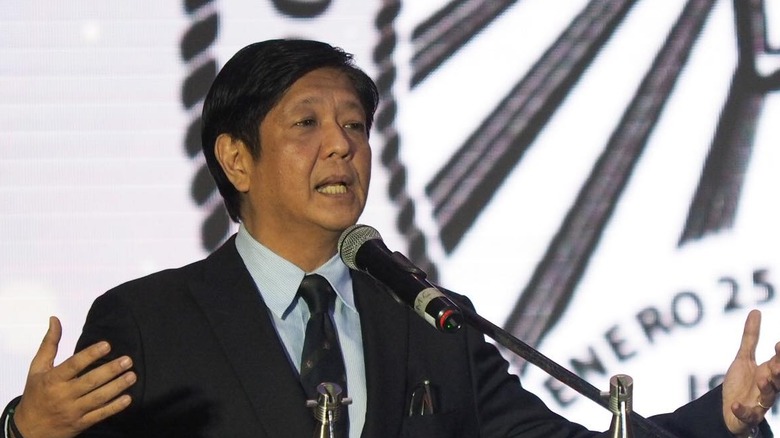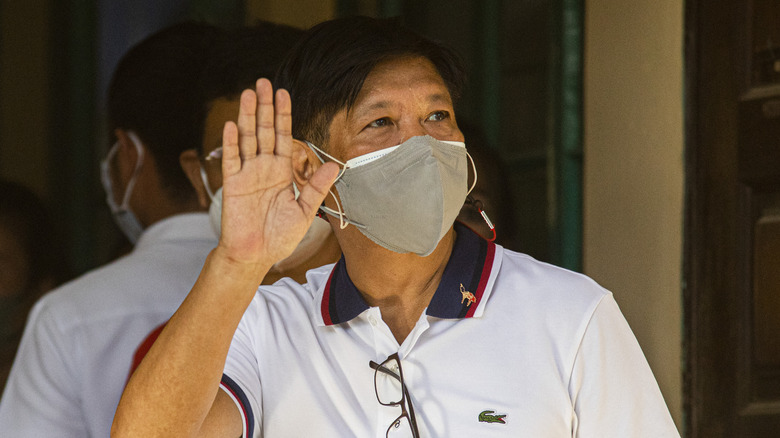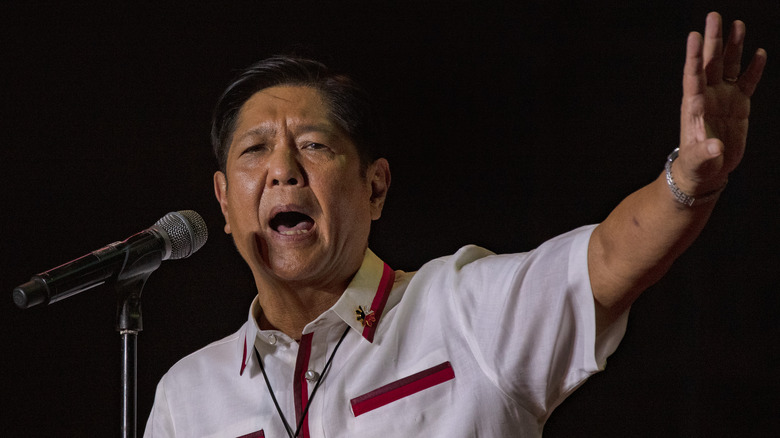The Untold Truth Of Bongbong Marcos
One can argue that no other political family has shaped the course of Philippine politics over the last century quite like the Marcoses. The seeds of what would become a long-running political dynasty were planted in 1925 when Mariano Marcos y Rubio won a seat at the House of Representatives as the congressman of the second district of Ilocos Norte, a province in Luzon (via Google Arts & Culture).
His son Ferdinand Sr. followed suit, building his own political career for more than a decade before eventually becoming the President of the Philippines in 1965, according to Encyclopedia Britannica. Seven years after Marcos Sr.'s ascent to the presidency, he placed the entire country under Martial Law, justifying the move as an urgent and necessary measure to solve "the present rebellion and lawlessness in the country." This allowed Marcos Sr. to stay in power for more than two decades, with the Martial Law years (1972 to 1981) becoming infamous for the thousands of human rights violations — arbitrary arrests, torture, disappearances, and killings — documented from that period (per Amnesty International).
The Marcos family's reign ended in 1986 via the People Power Revolution, described in the Official Gazette of the Republic of the Philippines as a "peaceful" movement that ended the dictatorship. But in an interesting turn of events, another Marcos – Ferdinand "Bongbong" Romualdez Marcos Jr., the late strongman's only son — is set to become the country's president, 36 years later.
Bongbong played himself in a biopic as a child
According to his Senate biography, Ferdinand "Bongbong" Marcos Jr. was born on September 13, 1957. For nearly his entire life, Marcos Jr. has never been away from the public eye. As Philstar put it, he has been "exposed to the limelight" since he was 3 years old, as part of his father's steady climb up the political ladder. In fact, even as a young boy, Marcos Jr. had a small but significant role to play (literally and figuratively) in Marcos Sr.'s successful bid for the presidency.
In 1965, 777 Films produced "Iginuhit ng Tadhana: The Ferdinand E. Marcos Story." Distributed by Sampaguita Pictures, "Iginuhit ng Tadhana" ("Drawn by Fate") is a two-hour and 16-minute biographical film focusing on the life of then-senator Marcos Sr., and was meant to help his presidential campaign. The movie — which, according to some, contributed to the elder Marcos winning the election that year (via Philstar) — featured a 7-year-old (often erroneously claimed as "8-year-old") Marcos Jr. playing himself. A sequel was released in 1969 as part of Marcos Sr.'s reelection bid, with a different actor portraying the younger Marcos.
Interestingly, a scene in "Iginuhit ng Tadhana" features Marcos Jr. playfully delivering a short mock speech before his sisters that begins with the lines: "Dear friends, ladies, and gentlemen, I am Bongbong Marcos. When I grow up, I want to be a politician."
His educational background is mired in controversy
After completing his primary education in the Philippines, Marcos Jr. continued his education at an all-boys abbey in England (via the Senate of the Philippines). He then pursued a Bachelor of Arts in Philosophy, Politics, and Economics at the University of Oxford, but did not complete his degree. Instead, the institution awarded him with a Special Diploma in Social Studies. After this, he enrolled at the Wharton School of Business in the U.S., under its Masters in Business Administration program — an academic pursuit that ended abruptly when he became the elected Vice Governor of Ilocos Norte in 1981.
The details of Marcos Jr.'s educational credentials — specifically, his time at Oxford — has been the subject of intense scrutiny. Critics have publicly denounced Marcos Jr.'s claims that he obtained a "degree" from the prestigious university (per CNN Philippines). Members of the Oxford Philippines Society have clarified that the special diploma awarded to Marcos Jr. "is not a degree, and neither is it comparable, superior nor equivalent to one," adding that the politician did not meet the degree program's requirement of passing the preliminary exams during his first attempt. In an interview with Bloomberg, the university also stated that Marcos Jr. "did not complete his degree," and explained that the diploma he holds "was not a full graduate diploma." Meanwhile, Marcos Jr. has said that he "suppose[s] there are differences, but [the ending] is that it is a bachelor's degree" (via ABS-CBN News).
He was studying in the UK when his father declared Martial Law in the Philippines
In a 2014 interview with GMA News Online, Marcos Jr. recounted that the day his father issued Proclamation 1081 (the decree that placed the entire Philippines under Martial Law), he was at school in England. "The person who called me was the ambassador to the Court of St. James, it was Jaime Zobel. He called me at school and said, 'Your father declared Martial Law.' That's it."
Marcos Jr. had just turned 15 at the time, a fact he confirmed in a Facebook post from 2012. He explained that he was neither consulted nor involved in the planning and declaration of Martial Law in the country.
Unsurprisingly, the strongman's son recalled how "people [were] saying how thankful they were for the relative peace and order that followed Martial Law," and that the main reason it was declared, per his understanding, "was the imminent danger posed to the state by the twin insurgencies waged by the armed communists and the secessionists in the south."
He has also stated that numerous avenues exist for those seeking justice for the abuses committed during the Marcos years (via GMA News Online). That said, Marcos Jr. also stated in his Facebook post that he does not believe Martial Law is "something to be considered in today's context."
Bongbong became a governor at 25 -- and had rockets named after him
Marcos Jr.'s first stab at a political career in the Philippines lasted a total of six years (per the Senate of the Philippines). At the age of 23 (via CNN), the Marcos heir won the position of Vice Governor of the province of Ilocos Norte, a title (for which he ran unopposed under Marcos Sr.'s political banner) that he held from 1981 to 1983. He then became the province's Governor via succession in 1983, a position he occupied until the 1986 People Power Revolution drove his family out of the Malacañang Palace.
A little-known fact about the Philippines — and by extension, about Marcos Jr. as well — was that in the early 1970s, the Marcos administration began its own missile program. According to Esquire Philippines, Project Santa Barbara was a classified national defense initiative, for which few photos, few records, and seemingly no blueprints exist. The program involved what NASA described as the country's "first liquid-propellant rocket": the Bongbong missile, reportedly named after Marcos Jr. In the 1972 edition of the agency's annual chronology of astronautics and aeronautics events, NASA noted that on March 12, the "Bong Bong II" rocket was successfully launched, then retrieved from the South China Sea. Three years later, the Bangor Daily News reported another successful firing of the "bongbong" rockets off the island of Luzon.
The Marcoses were exiled for 5 years
Marcos Jr.'s stint in public office came to a grinding halt when his family — including his father, his mother Imelda, and his sisters Irene and Imee — were forced to go into exile in Hawaii after the People Power Revolution that took place in February 1986 (via CNN).
According to the Official Gazette of the Republic of the Philippines, millions of Filipinos gathered along Epifanio de los Santos Avenue (EDSA) in Metro Manila over the course of four days to express their defiance against the "dictatorial regime" of Marcos Sr. The movement was prompted in large part by the results of the 1986 snap elections, which pitted the sitting president against Corazon C. Aquino, widow of assassinated senator and vocal Marcos opponent Benigno "Ninoy" Aquino Jr. When the elder Marcos proclaimed himself to be the winner, Aquino and two million of her supporters took to the streets in protest. Their non-violent demonstration eventually led to the official instatement of Aquino as the new Philippine president, effectively ending the 21-year reign of Marcos Sr.
For almost six years, the Marcos family stayed in Hawaii.; the ousted strongman passed away in September 1989 (via the Los Angeles Times). In 1991, they were allowed to return to the Philippines to face charges. The 34-year-old Marcos Jr. was among the first to arrive in the country — and he wasted no time in reviving his political career.
Marcos Jr. quickly resumed his political career
According to his biography on the official website of the Philippine Senate, Marcos Jr. became the Congressman of Ilocos Norte's Second District a year after he returned from exile. He held this position until 1995. Three years later, he was elected Governor of Ilocos Norte once again, a title he would hold for three consecutive terms.
After his final gubernatorial term in 2007, Marcos Jr. served as the Congressman of the Second District of Ilocos Norte once again. This time, he became the House of Representatives' Deputy Minority Leader. Following this, he served as a Philippine Senator from 2010 to 2016; out of the 12 candidates, he was ranked 7th.
Vote Pilipinas, the Commission on Elections' official partner in voter information for the 2022 national elections, provides a brief rundown of Marcos Jr.'s track record in public office. According to the site, the Marcos scion principally authored 42 bills as a congressman, but none of them were passed into law. Still, a few of them "ultimately contributed to the passage of laws that created the Department of Energy and the National Youth Commission." During his tenure as a Senator, Marcos Jr. co-authored two laws and authored 11.
He and his family faced multiple court battles
The decades-long process of recovering the alleged ill-gotten wealth of the Marcoses means that Marcos Jr. has been brought into numerous lawsuits as a defendant (via Vote Pilipinas). And while a few cases against the Marcos heir and his family have been dismissed for "insufficiency of evidence" per CNN Philippines, some have led to convictions or rulings against the Marcoses (per MindaNews). For example, the Sandiganbayan (the Philippines' special appellate court for graft and corruption cases in government) convicted Imelda Marcos in 2018 for seven counts of graft involving over $200 million in public funds (though she is believed to have stolen billions) sentencing her to at least 42 years of imprisonment (via Inquirer.net), she was able to evade jail time after paying a bail of P150,000 (about $2,800).
According to the Presidential Commission on Good Government (PCGG), a government task force created specifically to reclaim the alleged ill-gotten riches of the Marcoses and their allies, a total of P174.2 billion (about $3.3 billion) has been recovered as of March 2021 (per Vote Pilipinas). However, a staggering P125.9 billion (nearly $2.4 billion) still has to be reclaimed.
Notably, Marcos Jr. is also facing a contempt judgment by a U.S. court from 2011. Per CBS News, this order, which was upheld in 2012, was "for violating a previous court order instructing him to pay human rights victims around $2 billion of the wealth his family plundered from their country."
Marcos Jr. was implicated in a corruption scandal during his term as Senator
In 2013, midway through his six-year senatorial term, Marcos Jr. was named in a multi-billion-peso scandal revolving around the alleged misuse of government funds. According to the sworn affidavit of businesswoman and convicted mastermind Janet Lim-Napoles, Marcos Jr. was part of a long list of government officials who pocketed or misused their "pork barrel" funds — which are intended to serve as funds for education, health, social services, and other local projects at the official's discretion — by allocating them toward ghost projects via fake non-government organizations or foundations. A youth group also filed a lawsuit against Marcos Jr. in 2016, accusing him of diverting P205 million ($3.9 million) worth of funds toward nonexistent entities in 2011 and 2012 (via ABS-CBN News).
However, Marcos Jr. has vehemently denied his involvement in the scam. As reported by Inquirer.net in 2013, Marcos Jr. issued a public statement in which he expressed "shock and disbelief" at being implicated in the scandal. He also said that his office conducted an investigation, and found no records "pertaining to any transaction or endorsement from his office" about releasing his pork barrel for such anomalous projects. Aside from asserting that he had never met Napoles and that he had even pushed for the abolishment of said pork barrel funds, he also accused Philippine media outlets of peddling "inaccurate sensationalism."
He ran for Vice President and lost, but insisted he was cheated
In 2016, Marcos Jr. ran for the position of Vice President. Despite taking the lead in opinion polls prior to the elections (via CNN Philippines), Marcos Jr. ultimately lost to congresswoman and human rights lawyer Maria Leonor "Leni" Robredo, albeit by a slim margin. As the South China Morning Post reported, Robredo won the vice presidency by a margin of over 263,000 votes. As it turned out, Robredo's relatively small lead was enough for Marcos Jr. to demand a recount, protesting that he had been cheated (per CNN Philippines).
In his complaint filed that same year, Marcos Jr. specified three "pilot provinces" – Iloilo, Negros Oriental, and Robredo's home province, Camarines Sur — for the recount. Interestingly enough, the tribunal handling the electoral protest found that after the ballot recount, Robredo's lead increased by about 15,000. This ultimately led to the dismissal of Marcos Jr.'s election protest in 2021, nearly five years later (via Inquirer.net).
He decided to run for President while watching a light-fingered Marvel hero
Under the banner of Partido Federal ng Pilipinas (Federal Party of the Philippines), Marcos Jr. filed his candidacy for President in October 2021, albeit without a running mate (via ABS-CBN News). A month later, he "adopted" Sara Duterte, Mayor of Davao City and daughter of incumbent President Rodrigo Duterte (via Inquirer.net). While it may seem that Marcos Jr.'s failed bid for the Vice Presidency didn't deter his political ambitions in any way, his wife Louise Araneta–Marcos revealed in an interview that he actually felt the sting of his defeat ... and that it was a thumb-sized Marvel thief who helped him decide what his next steps would be.
As reported by CNN Philippines, Araneta-Marcos claimed that Marcos Jr. made the decision to run for President while watching the 2015 film "Ant-Man." "You know, six months ago, he wasn't yet sure what to do, he had no party [...] And then one day, we were watching 'Ant-Man' in the room, 'cause we love Marvel movies, and then he looked at me and he goes, 'Okay, we're gonna do this,' he told me. 'Do what?' 'Run for the presidency.'"
His family has been accused of running a long and intricate misinformation campaign
Some have accused Marcos Jr. and his family of whitewashing his father's legacy and setting up their political comeback via a stream of online revisionist content (via Vote Pilipinas). As Rappler reported in 2020, Brittany Kaiser, former business development director of Cambridge Analytica, claimed that Marcos Jr. sought their assistance to give his family a massive brand makeover. In response, the Marcoses called Kaiser's account "patently fake, false, and misleading," per CNN Philippines. Meanwhile, in an essay for Advocates Philippines, a communications professional revealed how he and his team went to great lengths to craft the perfect image for the Marcos heir — from "the right hairstyle" to the right words to say — and help him win the 2010 elections.
A recent investigative piece from the Washington Post closely examined the spread of pro-Marcos propaganda on social media platforms that are easily accessible in the Philippines (like YouTube and TikTok), as well as the use of troll farms to shape and influence public opinion. The article traces the Marcos family's "online revisionism project" all the way back to the 2000s, during which they allegedly utilized content that portrayed their family as "unfairly maligned," embellished the late strongman's legacy, and downplayed the plight of Martial Law victims.
However, Marcos Jr. remains adamant that he has never used troll farms to further his political campaign. "Find me one. Show me one. Just one. They don't exist" (via Inquirer.net).
The presumptive president-elect, following the 2022 Philippine elections
The unofficial results of the 2022 Philippine elections have painted a rather clear picture, consistent with what opinion polls in previous months had been suggesting (via The Guardian): Marcos Jr. is the presumptive President-elect of the Philippines, by an astounding margin.
As Reuters reported, the late strongman's son received over 31 million votes, more than twice the number of votes his closest rival (incumbent Vice President Leni Robredo, who ran as an independent candidate) received. Marcos Jr. is also said to be "the first candidate in recent history to win an outright majority in a Philippines presidential election," suggesting that his constant promises of "unifying leadership" and commitment to continue the projects of his populist predecessor (per Vote Pilipinas) deeply resonated with Filipino voters. Even though the official results are likely to be announced by the end of May, leaders of different nations across the world have already extended their messages of congratulations to Marcos Jr., including U.S. President Joe Biden, Russian President Vladimir Putin, Japanese Prime Minister Fumio Kishida, and Chinese President Xi Jinping (via ABS-CBN News).
In the face of claims of electoral fraud and reports of individuals and institutions being baselessly tagged as terrorists, per CNN Philippines, Marcos Jr. has vowed to become a leader who will unify the Filipino people. "Judge me not by my ancestors, but by my actions," said the man whose ascent to the Presidency was made possible, in part, by authoritarian nostalgia, according to one University of Philippines associate professor of political science (via The Guardian).
